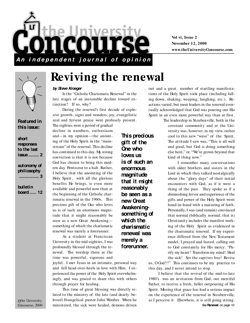Overbearing theology emasculates philosophy
by Oliver Heydorn
It was with dismay that I read Mr. Steve Kellmeyer’s article regarding the need of “a better theological base” for the philosophy department at FUS.
As I understand Kellmeyer, his basic claim is that if students in the philosophy programs had a better theological formation, they would never assert such a flagrant falsity as “the philosophy/theology of St. Thomas is essentially egoistical.”
I do not intend to deal here with the question of whether or not St. Thomas’ thought is in fact “egoistical,” nor with the semantics of the term. Rather, I would like to take issue precisely with his comment that the philosophy program at FUS needs “stronger theological underpinnings.”
In the first place, what Kellmeyer seems to have in mind by suggesting that the philosophy courses ought to be restructured within acceptable theological parameters, is nothing but the subordination of philosophy to theology whenever these two disciplines are found investigating the same issue. Thus, if theology informs us that St. Thomas’ thought is not egoistical, then it is sufficient for the philosopher to accept the judgement of the “Queen of the Sciences.” He can then either suspend inquiry into the matter, or he can conduct it in such a way that the results support the previously determined theological position.
Allow me to be blunt: the implementation of this view on the proper relation of philosophy to theology would lead to the complete dissolution of philosophy.
Philosophy, by its very nature as the theoretical, critical, and systematic analysis of the core, autonomously intelligible moments of reality, cannot accept positions as true which have not presented their credentials before the tribunal of reason. To do so would be to forfeit its critical character and hence to leave unfulfilled one of the necessary conditions for the practice of authentic philosophical inquiry.
Furthermore, it is not clear to me that even if one did claim that in some way St. Thomas’ philosophy/theology is egoistical that one may therefore be committed to the position that the philosophy/theology of the Church is essentially egoistical. In Fides et Ratio, the Pope rightly states that the Catholic Church has no official philosophy. Indeed, it is beyond the competency of the magisterium to claim that this or that philosophical system or method is the true one. The most that the Church can say is that a particular philosophical position is incompatible with revealed truth. With respect to theology, as far as I know the Church has no official theology either, as one must separate the reflections of theologians from the deposit and lived experience of faith. Thus, the first of Kellmeyer’s arguments is not sound because there is no (official) philosophy/theology of the Church that could be described as ‘egoistical’.
His second argument, that if one holds that Thomism is an ‘egoistical’ system, one may also be bound to hold that the Church was wrong to pronounce Thomas as a doctor of the Church (given that Catholicism is not a religion that thinks very highly of egoism) seems equally false. Much of St. Thomas’ writings do not touch directly or indirectly on the nature of human motivation at all. Consequently, even if St. Thomas presents a rational egoism in ethics and even if this falsifies moral data, it does not follow that the whole basis of his thought is erroneous. Hence, his writings could still serve as legitimate grounds for his being recognized as a distinguished teacher of Catholicism. Furthermore, it is entirely possible for a thinker to distort or to fail to capture the essence of love or of morality in his theoretical opinions, while nevertheless possessing a deep understanding of these essences on the basis of his own lived contact with the data. To claim that St. Thomas did not understand love adequately on the theoretical plane is therefore not degrading to Thomas, or to the Church’s understanding of and judgement on Thomas’ works.
Let me conclude by returning to the original question: does the philosophy department at FUS need stronger theological foundations? It seems to me that Kellmeyer’s article has only succeeding in demonstrating the reverse to be true.
Oliver Heydorn, FUS MA Philosophy Program


